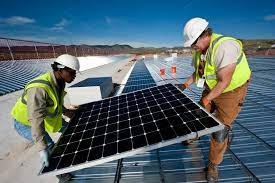Economic growth can no longer rely on harmful, expensive fossil fuel
By Jeph Ajobaju, Chief Copy Editor
Hope of economic growth in Africa can no longer rely on harmful and expensive fossil fuel to power industry, businesses, and homes. Green energy is cheaper, renewable, inexhaustible, and causes no harm to the environment.
Sources of renewable energy include wind, solar, hydropower, and bioenergy. Companies are also investing in tidal waves, a largely untapped but vast and abundant source of tidal energy.
Wind is currently one of the cheapest green energy sources but it is not as universally available as solar power. Solar energy is tapped from the sun which shines on all parts of the earth and is not exhaustible.
It only requires more research and development to get the full, cheap, and universal benefits of solar power. So everywhere in the world, including Africa, adopting solar energy is the best and safest thing to do in the long run.
Hiccups in Africa
A report by the BBC shows, however, that while much of the world is looking at how it can use more green energy and cut C02 emissions, across Africa the challenge is somewhat different.
For many across the continent, it’s the challenge of accessing any energy supply at all. Some 600 million people in Africa don’t have access to energy – limiting their ability to start and run businesses.
Even in the megacities of South Africa and Nigeria, businesses have to deal with rolling power blackouts. So governments, entrepreneurs and innovators are working to fix this.
__________________________________________________________________
Related articles:
Oceans and rivers generating huge electricity
Surprising facts about solar energy
__________________________________________________________________
In Ghana, the Ministry of Power says more than 80 per cent of the population has access to electricity on the national grid. But reaching those in remote communities has been a challenge.
So the country is using microgrids – independent energy systems serving specific areas – to provide low-cost, clean energy, powered by solar and wind power to isolated communities.
In Pediatokope, an island community on the Volta river in Ghana, shopkeeper Eric Pupulampu is delighted. His business has been helped because he is now able to stock and sell cold drinks and perishables – thanks to a microgrid project that gives him the power to keep his freezer going.
Urban challenges
But the challenge is not just rural, as major cities have power problems too.
Approximately 15 million people live in Lagos in Nigeria, making it one of Africa’s busiest cities, but the energy supply in the city is neither stable nor secure.
This unreliability means that the majority of those with access to grid electricity still have to use alternative power sources – mainly petrol and diesel generators.
And according to the Energy Commission of Nigeria, Nigerians spend $22 billion (£16 billion) a year paying for generators to power their offices and homes. Not surprisingly, companies are looking for solutions that will offer stable power that is also greener.
Many see the gas sector as being kinder to the environment than oil, and therefore a viable proposition alongside renewable energy. Gas-fired plants already account for about 80 per cent of Nigeria’s electricity capacity.
According to some experts, natural gas plants are more than twice as reliable as solar plants and produce four times more energy per acre of land.
“People see gas as a halfway house between fossil fuels like oil, and renewable energy,” says Rolake Akinkugbe-Filani, a member of the Africa Energy Chamber’s Advisory Board.
“Gas has a lower carbon footprint than oil. Nigeria is the country with the largest gas reserves in Africa and the ninth largest in the world, so it makes sense to make use of these resources.
“But gas requires infrastructure for processing and distribution, and somebody has to invest in that, with long-term financing.”
Clean energy, new jobs
Over the last decade, Olusola Lawson has been responsible for investing more than half a billion dollars in power and infrastructure projects around the continent for the firm African Infrastructure Investment Managers.
His company has made investments in both the gas and solar sectors, and he is clear about the outlook for Africa’s energy future.
“By 2050 about half of the new energy installed across Africa is going to be renewable energy,” he says.
“There has been an 80 per cent reduction in solar prices over the last decade, and an 85 per cent reduction in battery prices. The combination of those two things is making certain types of electricity provision quite attractive.
“The most plentiful resource we have is not oil and gas – it’s sunlight. We’re only at the start of a revolution that will continue – as solar panel prices reduce and battery technology improves.”
It is a revolution that some hope will bring not just clean energy, but new jobs as well.
By the end of this decade, 65 million new jobs around the world are expected to be created in the so-called low-carbon industries, and firms offering training for jobs in solar are springing up across Africa.
It is a welcome intervention – as in some African countries, unemployment has risen to 33 per cent.
South Africa-based Green Solar Academy and its partners across the continent provide training and hands-on workshops that cover everything from solar theory to system design and the basics of running a solar business.
“Solar has provided a new niche where people are finding opportunities as wholesalers, designers, installers and salespeople” says Khumbudzo Amanda Dzivhani, senior operations manager at Green Solar.
“It’s opened up a space for people to create job opportunities for themselves and for others. That’s important because the unemployment rate, especially of the youth, is increasing everywhere.”
With more investment into cleaner energy sources, African countries could create a twofold solution to some of the biggest challenges of the future – reducing their carbon footprints and also creating new employment opportunities.













